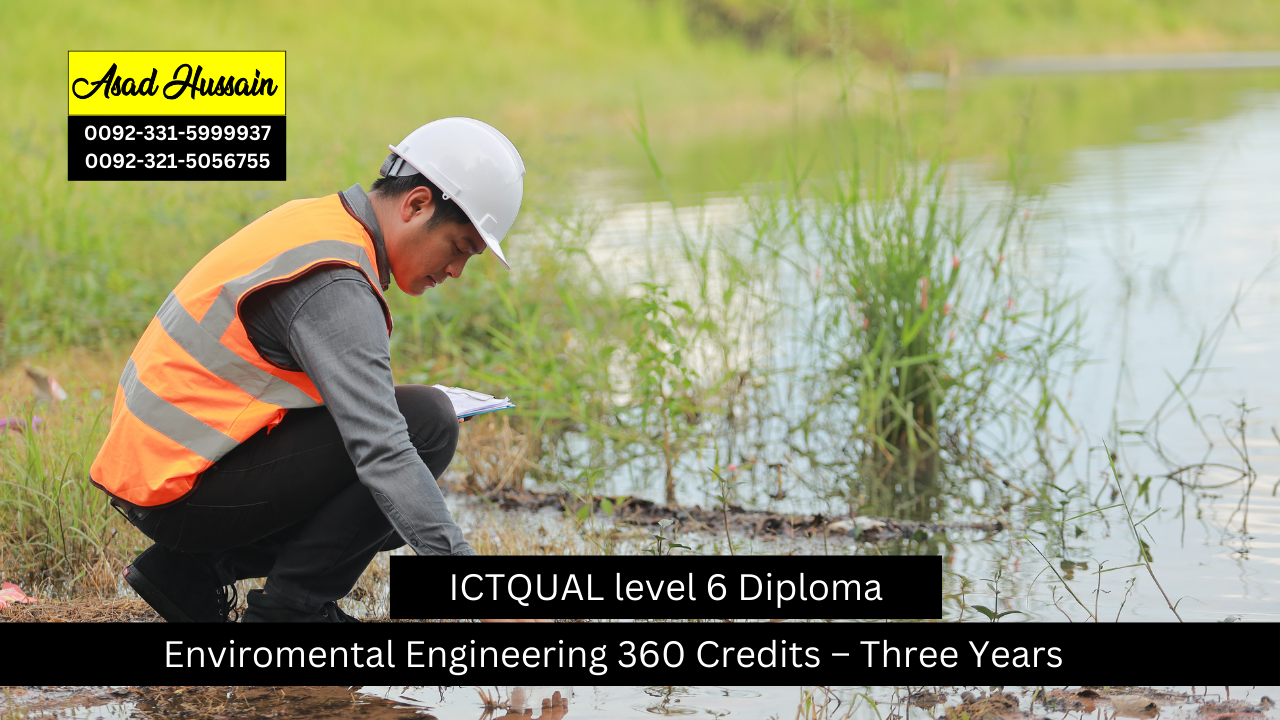The ICTQual Level 6 Diploma in Environmental Engineering is a prestigious qualification designed for individuals who aspire to make a difference in the field of environmental sustainability, engineering, and management. This comprehensive program is recognized for its depth and relevance to today’s environmental challenges, providing students with the necessary skills and knowledge to take on advanced roles in the sector. Spanning three years and worth 360 credits, this qualification is ideal for those looking to specialize in environmental engineering and make meaningful contributions to addressing global environmental issues.
The ICTQual Level 6 Diploma in Environmental Engineering is an advanced qualification aimed at individuals who have a foundational understanding of engineering principles and wish to focus on environmental concerns. The course covers a broad range of topics, including sustainable development, waste management, environmental policy, and energy conservation, all underpinned by robust engineering principles. The program is divided into three years of study, with a comprehensive set of modules designed to develop both theoretical knowledge and practical skills in environmental engineering.
The ICTQual Level 6 Diploma in Environmental Engineering is a top-tier qualification that provides students with the tools and knowledge they need to address some of the most pressing environmental challenges of our time. With a solid foundation in engineering principles and a focus on sustainability, graduates are well-positioned to enter the workforce as highly skilled environmental engineers, consultants, or managers. Whether you’re looking to embark on a career in environmental engineering or further your expertise in the field, this diploma offers a comprehensive pathway toward success.
Program Highlights
Year 1: Foundations of Environmental Engineering
- Introduction to Environmental Engineering
- Environmental Science Principles
- Basics of Environmental Chemistry
- Introduction to Renewable Energy Systems
- Mathematics for Environmental Engineers
- Engineering Mechanics and Materials
- Introduction to Fluid Mechanics
- Pollution Control and Prevention
- Environmental Regulations and Standards
- Soil Science and Geotechnical Engineering
- Introduction to Sustainable Development
- Communication Skills for Engineers
Year 2: Specialized Environmental Engineering Topics
- Advanced Water Supply and Wastewater Treatment
- Air Pollution Control and Management
- Waste Management and Recycling Techniques
- Hydrology and Water Resources Management
- Advanced Renewable Energy Technologies
- Environmental Impact Assessment (EIA)
- Risk Management in Environmental Engineering
- Environmental Economics and Policy
- Sustainable Infrastructure and Urban Planning
- Climate Change and Environmental Adaptation
- Environmental Data Collection and Analysis
- Environmental Project Management
Year 3: Advanced Studies and Practical Applications
- Sustainable Resource Management
- Advanced Environmental Chemistry
- Energy Efficiency and Green Technologies
- Environmental Monitoring and Data Systems
- Life Cycle Assessment and Eco-Design
- Green Building and Construction Techniques
- Environmental Biotechnology
- Environmental Law and Ethics
- Research Methodology in Environmental Engineering
- Environmental Engineering Design Projects
- Industrial Internship in Environmental Engineering
- Research Project and Dissertation
o enroll in the ICTQual Level 6 Diploma in Environmental Engineering, candidates must meet the following entry requirements:
- Applicants must be at least 18 years old.
- A minimum of a Level 5 qualification (or equivalent) in a related field such as environmental science, engineering, or a technical discipline. This could include a Level 5 Diploma, a Higher National Diploma (HND), or a relevant undergraduate degree.
- Alternatively, applicants with substantial work experience in environmental engineering or a related field may be considered on an individual basis.
- Academic requirements generally include qualifications equivalent to GCSEs or A-levels, with a strong foundation in Mathematics, Science, and English (grade C or above).
Year 1: Foundations of Environmental Engineering
Introduction to Environmental Engineering
- Understand the fundamental concepts and scope of environmental engineering.
- Explore the role of environmental engineers in addressing global environmental challenges.
Environmental Science Principles
- Gain knowledge of key environmental science concepts and their application in engineering.
- Assess the interaction between human activities and environmental systems.
Basics of Environmental Chemistry
- Learn about chemical processes that affect environmental systems.
- Identify pollutants and evaluate their impact on air, water, and soil quality.
Introduction to Renewable Energy Systems
- Overview of renewable energy technologies, including solar, wind, and biomass.
- Evaluate the environmental advantages and challenges of renewable energy sources.
Mathematics for Environmental Engineers
- Apply mathematical principles to solve engineering problems related to environmental systems.
- Develop skills in calculations for fluid dynamics, pollution control, and energy efficiency.
Engineering Mechanics and Materials
- Understand engineering mechanics in the context of environmental engineering.
- Learn about materials used in environmental engineering and their properties.
Introduction to Fluid Mechanics
- Grasp fundamental concepts in fluid mechanics such as flow, pressure, and velocity.
- Apply fluid dynamics to environmental engineering issues like water treatment and waste management.
Pollution Control and Prevention
- Identify various types of pollution and their sources.
- Propose engineering solutions for the prevention and control of pollution in different environments.
Environmental Regulations and Standards
- Understand national and international environmental laws and regulations.
- Evaluate the impact of these regulations on environmental engineering practices.
Soil Science and Geotechnical Engineering
- Learn about soil properties and their importance in environmental engineering.
- Analyze soil contamination and explore remediation techniques.
Introduction to Sustainable Development
- Define sustainable development and its significance in environmental engineering.
- Identify practices that promote sustainability in engineering projects.
Communication Skills for Engineers
- Develop effective communication skills for technical writing, presentations, and teamwork.
- Present complex environmental engineering concepts clearly and concisely.
Year 2: Specialized Environmental Engineering Topics
Advanced Water Supply and Wastewater Treatment
- Explore advanced techniques in water purification, treatment, and distribution.
- Design and evaluate wastewater treatment systems with a focus on sustainability.
Air Pollution Control and Management
- Identify sources of air pollution and assess their environmental impact.
- Develop strategies for air quality monitoring and pollution control.
Waste Management and Recycling Techniques
- Analyze waste management practices and explore recycling technologies.
- Design sustainable waste management systems for urban and industrial applications.
Hydrology and Water Resources Management
- Apply hydrological principles to efficiently manage water resources.
- Design systems for water conservation and sustainable use.
Advanced Renewable Energy Technologies
- Analyze emerging renewable energy technologies.
- Develop engineering solutions for integrating renewable energy systems into existing infrastructures.
Environmental Impact Assessment (EIA)
- Conduct environmental impact assessments for engineering projects.
- Identify potential environmental impacts and propose mitigation strategies.
Risk Management in Environmental Engineering
- Apply risk management strategies to evaluate and minimize environmental risks.
- Develop risk assessment models for environmental engineering projects.
Environmental Economics and Policy
- Understand the economic dimensions of environmental issues and sustainability.
- Analyze policies and their effect on environmental engineering practices.
Sustainable Infrastructure and Urban Planning
- Design and evaluate infrastructure projects with a focus on sustainability.
- Incorporate sustainable urban planning principles into engineering solutions.
Climate Change and Environmental Adaptation
- Investigate the effects of climate change on environmental systems.
- Develop engineering strategies for adapting to climate change challenges.
Environmental Data Collection and Analysis
- Collect and analyze environmental data to inform engineering decisions.
- Use software tools and methodologies for interpreting environmental data effectively.
Environmental Project Management
- Manage environmental engineering projects, from planning to execution.
- Develop project management skills, including budgeting, timelines, and team coordination.
Year 3: Advanced Studies and Practical Applications
Sustainable Resource Management
- Understand the principles of sustainable resource use and conservation.
- Design systems for the efficient management of natural resources.
Advanced Environmental Chemistry
- Apply advanced chemical principles to address complex environmental challenges.
- Analyze chemical processes involved in pollutant degradation and treatment.
Energy Efficiency and Green Technologies
- Design and implement energy-efficient systems and green technologies.
- Analyze the role of energy efficiency in reducing environmental impacts.
Environmental Monitoring and Data Systems
- Develop and implement systems for monitoring environmental parameters.
- Utilize advanced technologies for environmental data collection and analysis.
Life Cycle Assessment and Eco-Design
- Conduct life cycle assessments to evaluate the environmental impacts of products and processes.
- Apply eco-design principles to develop environmentally friendly products and systems.
Green Building and Construction Techniques
- Understand sustainable construction methods and green building standards.
- Design and implement energy-efficient and environmentally sustainable buildings.
Environmental Biotechnology
- Explore the use of biotechnology in environmental engineering applications.
- Study the role of bioremediation and microbial technologies in environmental cleanup.
Environmental Law and Ethics
- Understand the legal and ethical considerations in environmental engineering.
- Evaluate the role of laws in regulating environmental protection and engineering practices.
Research Methodology in Environmental Engineering
- Develop skills in research design and methodology specific to environmental engineering.
- Conduct scientific research and analysis on environmental engineering topics.
Environmental Engineering Design Projects
- Apply engineering principles to design sustainable environmental systems and solutions.
- Work on complex design projects that address real-world environmental issues.
Industrial Internship in Environmental Engineering
- Gain hands-on experience through an industrial internship.
- Apply theoretical knowledge to practical environmental engineering tasks in the workplace.
Research Project and Dissertation
- Conduct independent research on a selected environmental engineering topic.
- Present your findings in a comprehensive dissertation that demonstrates critical thinking and research skills.
The ICTQual Level 6 Diploma in Environmental Engineering 360 Credits – Three Years is designed for individuals who are passionate about environmental sustainability and engineering, and who wish to pursue a career in the growing field of environmental engineering. This course is ideal for:
1. Aspiring Environmental Engineers
- Individuals looking to start a career in environmental engineering and related fields. The course provides the necessary knowledge and practical skills to solve global environmental challenges.
2. Professionals Seeking Career Advancement
- Those already working in related fields such as environmental science, civil engineering, or technical disciplines, who wish to specialize in environmental engineering and enhance their qualifications to take on more advanced roles.
3. Graduates with a Related Qualification
- People who hold a Level 5 qualification (or equivalent) in environmental science, engineering, or another technical field, and wish to further their expertise with a specialized qualification in environmental engineering.
4. Individuals with Relevant Work Experience
- Candidates with significant professional experience in environmental engineering or related industries may also apply. The course allows professionals to formalize their expertise and gain advanced knowledge through a structured educational program.
5. Career Changers
- Those looking to transition into the environmental sector from a different field, particularly those with an interest in sustainability, engineering, and environmental protection.
6. Students Interested in Global Environmental Issues
- Individuals who are passionate about addressing pressing global environmental issues such as climate change, pollution, and resource management, and want to make a tangible impact through engineering solutions.
7. International Students
- The qualification is recognized internationally, making it suitable for students who wish to work in environmental engineering roles around the world.







